How to improve your English quickly
- 格式:pptx
- 大小:2.07 MB
- 文档页数:20
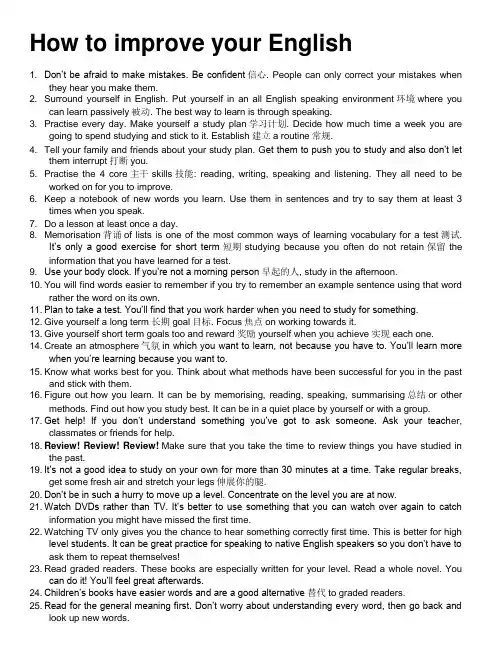
How to improve your English1. Don‟t be afraid to make mistakes. Be confident信心. People can only correct your mistakes whenthey hear you make them.2. Surround yourself in English. Put yourself in an all English speaking environment环境where youcan learn passively被动. The best way to learn is through speaking.3. Practise every day. Make yourself a study plan学习计划. Decide how much time a week you aregoing to spend studying and stick to it. Establish建立a routine常规.4. Tell your family and friends about your study plan. G et them to push you to study and also don‟t letthem interrupt打断you.5. Practise the 4 core主干skills技能: reading, writing, speaking and listening. They all need to beworked on for you to improve.6. Keep a notebook of new words you learn. Use them in sentences and try to say them at least 3times when you speak.7. Do a lesson at least once a day.8. Memorisation背诵of lists is one of the most common ways of learning vocabulary for a test测试.It‟s only a good exercise for short term短期studying because you often do not retain保留the information that you have learned for a test.9. Use your body clock. If you‟re not a morning person早起的人, study in the afternoon.10. You will find words easier to remember if you try to remember an example sentence using that wordrather the word on its own.11. Plan to take a test. You‟ll find that you work harder when you need to study for something.12. Give yourself a long term长期goal目标. Focus焦点on working towards it.13. Give yourself short term goals too and reward奖励yourself when you achieve实现each one.14. Create an atmosphere气氛in which you want to learn, not because you have to. You‟ll learn morewhen you‟re learning because you want to.15. Know what works best for you. Think about what methods have been successful for you in the pastand stick with them.16. Figure out how you learn. It can be by memorising, reading, speaking, summarising总结or othermethods. Find out how you study best. It can be in a quiet place by yourself or with a group.17. Get help! If you don‟t understand something you‟ve got to ask someone. Ask your teach er,classmates or friends for help.18. Review! Review! Review! Make sure that you take the time to review things you have studied inthe past.19. It‟s not a good idea to study on your own for more than 30 minutes at a time. Take regular breaks,get some fresh air and stretch your legs伸展你的腿.20. Don‟t be in such a hurry to move up a level. Concentrate on the level you are at now.21. Watch DVDs rather than TV. It‟s better to use something that you can watch over again to catchinformation you might have missed the first time.22. Watching TV only gives you the chance to hear something correctly first time. This is better for highlevel students. It can be great practice for speaking to native English speakers so you don‟t have to ask them to repeat themselves!23. Read graded readers. These books are especially written for your level. Read a whole novel. Youcan do it! You‟ll feel great afterwards.24. Children‟s books have easier words and are a good alternative替代to graded readers.25. Read for the general meaning first. Don‟t worry about understanding every word, then go back andlook up new words.26. For a word you don‟t understand in a sentence, look at the other words around it. They will give youa hint暗示. Try to guess the meaning from the context景况.27. Use English whenever you can. It‟s as simple as that!28. Don‟t translate into English from your own language. Think in English to improve your fluency流畅.Talk to yourself…but not on the bus otherwise people will think you have gone crazy!29. You can‟t learn English from a book. Like driving a car, you can only learn through doing it.30. The most natural自然way to learn grammar is through talking.31. Keep an English diary日记or journal. Start by writing a few sentences a day and then get into thehabit of writing more.32. Why not start an online blog博客 and share your writings with the world?33. Keep an eye on your punctuation标点as it can totally change what you‟re trying to say. Check outthe difference in meaning between these two sentences: “A woman without her man is nothing” and “A woman: without her, man is nothing”.34. Sing your heart out! Show the world your beautiful voice! Learn English songs and sing along withthem to improve fluency and intonation腔调… anyone for Karaoke卡拉OK?35. Get a penfriend笔友or use chat-rooms, forums论坛and community sites. If you can‟t speak tosomeone in English, this is the next best thing.36. Shadow English CDs. Listen to a few sentences then repeat what you heard. Focus on the rhythm韵律and intonation.37. Have English radio on in your house. Even if you are not actively listening to it, you will still betraining your ears.38. Dictation听写. Listen to a CD or friend and write down what you hear.39. Nobody likes to hear their own voice, but be brave and try it! Record记录your voice and listen toyour pronunciation and intonation. It will help you to identify鉴定your problem areas.40. Ask your helpful teacher if you can record his lesson. This is a great way to review. You can alsolisten to your teachers speaking speed and intonation.41. Use an English/English dictionary as it will help you to keep thinking in English and not translating.42. If an English/English dictionary seems scary, there are learner‟s dictionaries for English students ofyour level.43. Don‟t become too reliant信赖的on your dictionary. Your dictionary should be an aid援助, not yourmain teacher. Try to guess the meaning of words rather than going straight for your dictionary.44. Don‟t give up! Stay positive! Sometimes you will feel that you aren‟t learning quickly enough.Everyone feels like t his, don‟t worry about it. You‟ll get there in the end.45. Enjoy it! We learn more when we are having fun!46. If you get nervous when speaking, take two deep breaths before you say something. You‟ll speakbetter when you feel relaxed.47. Keep yourself motivated by looking back at the textbooks and CDs you used in the past. You‟ll besurprised at how easy they seem to you now! Congratulations, your level is improving!48. You are never too young or too old to start learning English. Don‟t make excuses not to learn. Whatare you waiting for?49. If you haven‟t gotten the results you wanted yet, it‟s not because you‟re bad at languages, it‟sbecause you haven‟t found your own special way of learning yet.50. Use resources资源which match your level. Don‟t use texts/listening exercises which are too difficultor too easy. Use materials which challenge挑战you but don‟t frustrate阻挠you.51. Don‟t worry about making your accent perfect. It‟s an important part of your cultural identity to keepyour accent. Native English speakers enjoy hearing English spoken with an accent.52. There are many types of English: British, American, South African and so on. None of these arewrong or not as important. English is English.53. Instead, be aware of the differences in American and British English and use your wordsaccordingly. For example: Elevator (US) / Lift (British).54. Use post-it notes and stick them around your home. You can use them to label标签things. Stickone on your pet dog!55. Use your intuition直觉. Go with your gut feeling, you‟ll be surprised how often your first guess is theright guess. Like we said before, be confident.56. Gather your thoughts. Take a second to think about what you‟re going to say. You know thegrammar, but maybe you don‟t use it correctly when you speak.57. Meet new people. Make the effort to mix with English speakers in your town. You could join a club俱乐部or go to bars where foreigners hang out. Buy one a drink, they love that!58. Be the person to start conversations in English. Try to keep the conversations moving and uselistening words (…really?‟ / …go on…‟/ …what happened then?‟) Don‟t wait for others to speak to you.Get in there!59. Debate辩论. Discuss topics in a group. Each person should choose a viewpoint (even if you don‟tagree with it) and debate it within the group. Make sure you get your point across. Learn to listen actively. Active listening will help in the classroom and it will help you get more out of, and contribute 贡献more to, group study sessions. Focus on the person who is talking. Don‟t fidget or become distracted by other people or events. Concentrate on the speaker with your ears and eyes. Follow the movements the speaker makes in an effort to hear more. It may help to repeat what you hear others say in an effort to understand their thoughts.60. It‟s not enough to only learn English words. You can teach a parrot English words but that doesn‟tmean it can speak English! You still need to have an understanding of grammar.61. Keep it up! If you take a break from speaking English, you will find that your level decreases and allyour hard work has been wasted.62. Don‟t be put off by a bad test score. Sometimes students have the ability to pass an English test,but can‟t communicate well with English speakers. If you can speak freely in English, you should be proud of yourself.63. Remember that as long as you have tried your hardest, you have succeeded!64. Learn English with a friend. You‟ll have someone you can practice with and you can motivate刺激each other to study.65. Keep in mind that it takes longer to improve when our level is high. Usually the fastest progress ismade when we are beginners. Don‟t think that you‟re suddenly not learning anymore, it‟s just a less noticeable progress.66. Make sure that your English matches the occasion. It‟s OK to use slang俚语with friends but not in abusiness meeting. Decide in which situation it‟s appropriate to use the words and phrases you have learned.67. Textbook English is often different from the way we casually speak. To learn casual …slang‟ watchmovies.68. Idioms can be difficult to memorise, but they are great fun to use and they‟ll make your English morecolourful.69. Think about your strong and weak points. Write down which areas you want to improve on and workon improving them. Of course, don‟t ignore your strong points. Congratulate yourself on how well you‟ve done!70. For fluency, try image training. Before you go to that restaurant think through what the waiter islikely to say to you. Think of what phrases you are going to use.71. If you studying abroad, mix with people from other countries not only people from your own country.It‟s not a good idea for you to live in a shared house with people from your own country. Enjoy a more cultural文化experience by spending time with other nationalities国籍.72. Have you thought about getting a job or doing an internship实习abroad?73. Get yourself a qualified teacher. Who wants to learn wrong things?74. Once you have a basic level of English explore the different ways you can say the same thing. Thismakes your English more interesting to the listener and it shouldn‟t be too difficult for you because y ou already know the basics. For example, how many ways can we say, …Goodbye… in English?75. When you are on your English course, be prepared for your class. Do your homework as soon aspossible and hand it in on time. Review your notes and your last lesson a few minutes before the class. Doing this will refresh your memory and you‟ll be warmed up for lesson.76. Don‟t get distracted愣in class. Focus on the lesson, don‟t stare out of the window. Don‟t be late,arrive a few minutes before the start of the lesson. Don‟t sit next to people who won‟t speak to you in English. Switch off your phone. Be organized, remember to take your textbook, notebook and pen.77. Find a comfortable, peaceful place for quiet study. You need somewhere where you can focus100%.。
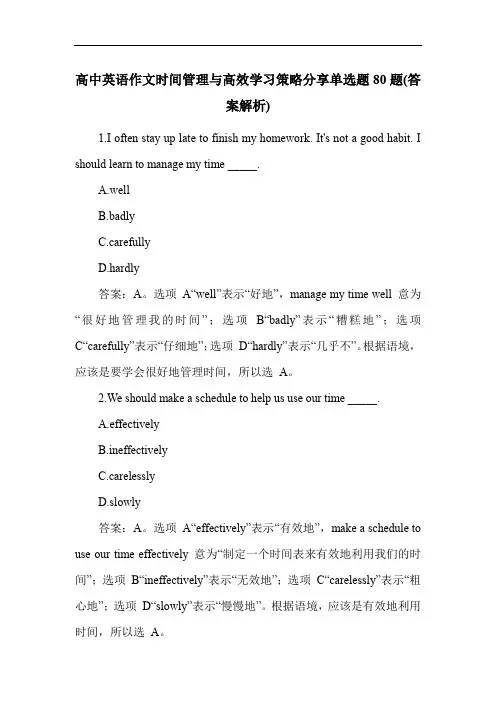
高中英语作文时间管理与高效学习策略分享单选题80题(答案解析)1.I often stay up late to finish my homework. It's not a good habit. I should learn to manage my time _____.A.wellB.badlyC.carefullyD.hardly答案:A。
选项A“well”表示“好地”,manage my time well 意为“很好地管理我的时间”;选项B“badly”表示“糟糕地”;选项C“carefully”表示“仔细地”;选项D“hardly”表示“几乎不”。
根据语境,应该是要学会很好地管理时间,所以选A。
2.We should make a schedule to help us use our time _____.A.effectivelyB.ineffectivelyC.carelesslyD.slowly答案:A。
选项A“effectively”表示“有效地”,make a schedule to use our time effectively 意为“制定一个时间表来有效地利用我们的时间”;选项B“ineffectively”表示“无效地”;选项C“carelessly”表示“粗心地”;选项D“slowly”表示“慢慢地”。
根据语境,应该是有效地利用时间,所以选A。
3.She is always busy with her studies. She tries to finish her tasks _____ time.A.onB.inC.atD.for答案:B。
in time 表示“及时”;on time 表示“按时”;at time 没有这个固定搭配;for time 也不是正确的短语。
根据语境,她总是忙于学习,努力及时完成任务,所以选B。
4.It's important to plan our day carefully so that we can complete all our tasks _____ schedule.A.inB.onC.atD.for答案:B。

1、英语翻译或修改将其他语言翻译成英文,或改进你提供的英文句子。
我希望你能充当英语翻译、拼写纠正者和改进者。
我将用任何语言与你交谈,你将检测语言,翻译它,并在我的文本的更正和改进版本中用英语回答。
我希望你用更漂亮、更优雅、更高级的英语单词和句子来取代我的简化A0 级单词和句子。
保持意思不变,但让它们更有文学性。
我希望你只回答更正,改进,而不是其他,不要写解释。
我的第一句话是[要翻译的语言]I want you to act as an English translator, spelling corrector and improver. I will speak to you in any language and you will detect the language, translate it and answer in the corrected and improved version of my text, in English. I want you to replace my simplified A0-level words and sentences with more beautiful and elegant, upper level English words and sentences. Keep the meaning same, but make them more literary. I want you to only reply the correction, the improvements and nothing else, do not write explanations. My first sentence is [要翻译的语言]2、中英互译英汉互译+ 可定制风格+ 可学习英语。
现在你是一个英汉互译器,当我输入中文时,你翻译成英文;当我输入英文时,请翻译成中文。
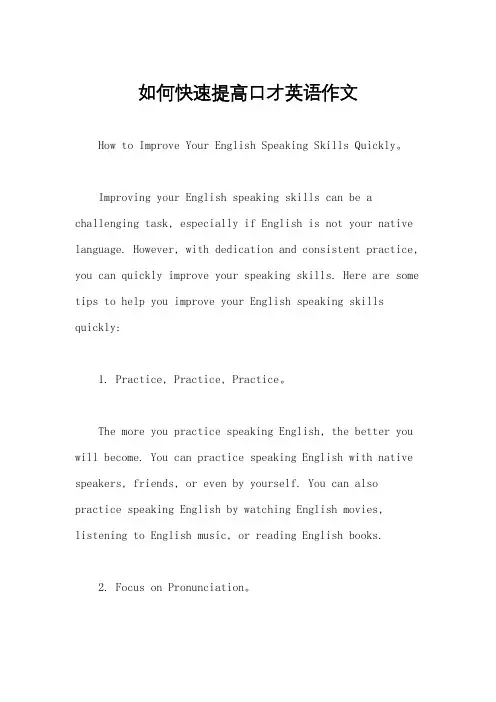
如何快速提高口才英语作文How to Improve Your English Speaking Skills Quickly。
Improving your English speaking skills can be a challenging task, especially if English is not your native language. However, with dedication and consistent practice, you can quickly improve your speaking skills. Here are some tips to help you improve your English speaking skills quickly:1. Practice, Practice, Practice。
The more you practice speaking English, the better you will become. You can practice speaking English with native speakers, friends, or even by yourself. You can also practice speaking English by watching English movies, listening to English music, or reading English books.2. Focus on Pronunciation。
Pronunciation is an important part of speaking English. If your pronunciation is poor, it can be difficult for others to understand you. Therefore, it is important to focus on improving your pronunciation. You can do this by listening to native speakers, practicing tongue twisters, and using pronunciation apps.3. Learn Vocabulary。
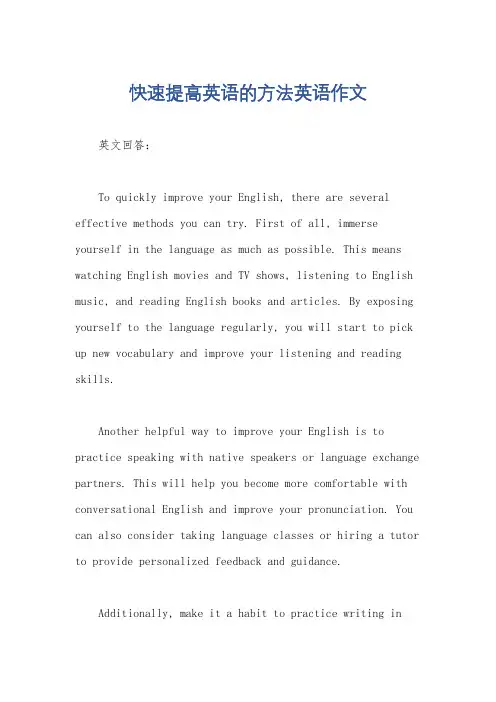
快速提高英语的方法英语作文英文回答:To quickly improve your English, there are several effective methods you can try. First of all, immerse yourself in the language as much as possible. This means watching English movies and TV shows, listening to English music, and reading English books and articles. By exposing yourself to the language regularly, you will start to pick up new vocabulary and improve your listening and reading skills.Another helpful way to improve your English is to practice speaking with native speakers or language exchange partners. This will help you become more comfortable with conversational English and improve your pronunciation. You can also consider taking language classes or hiring a tutor to provide personalized feedback and guidance.Additionally, make it a habit to practice writing inEnglish regularly. This could be through keeping a journal, writing emails, or even participating in online forums or social media in English. By practicing writing, you will become more confident in expressing your thoughts and ideas in English.Lastly, don't be afraid to make mistakes. Learning a new language is a process, and making mistakes is a natural part of that process. Embrace your mistakes asopportunities for learning and improvement.中文回答:要快速提高英语水平,有几种有效的方法可以尝试。

怎样做到快速学会英语作文How to Learn English Quickly。
English is a global language that is spoken by millions of people worldwide. It is considered as the language of international communication, business, and education. Therefore, learning English is essential for anyone who wants to succeed in today's world. However, many peoplefind it difficult to learn English, especially if it is not their first language. In this article, we will discuss some tips on how to learn English quickly.1. Set Goals。
The first step in learning English is to set goals. You need to know what you want to achieve and why you want to learn English. Do you want to improve your English for work, travel, or personal development? Once you have set your goals, you can create a plan to achieve them. Your plan should include the resources you need, such as textbooks,online courses, or a tutor.2. Practice Speaking。
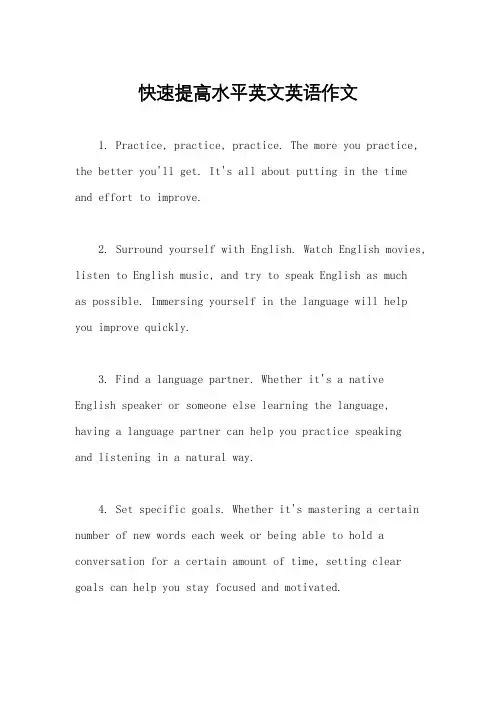
快速提高水平英文英语作文1. Practice, practice, practice. The more you practice, the better you'll get. It's all about putting in the time and effort to improve.2. Surround yourself with English. Watch English movies, listen to English music, and try to speak English as muchas possible. Immersing yourself in the language will help you improve quickly.3. Find a language partner. Whether it's a native English speaker or someone else learning the language, having a language partner can help you practice speakingand listening in a natural way.4. Set specific goals. Whether it's mastering a certain number of new words each week or being able to hold a conversation for a certain amount of time, setting clear goals can help you stay focused and motivated.5. Don't be afraid to make mistakes. Making mistakes isa natural part of learning a language. Embrace them and use them as learning opportunities.6. Use language learning apps and websites. There are plenty of resources available online to help you improve your English, from vocabulary-building apps to language exchange websites.7. Take an English course. Whether it's a formal classroom setting or an online course, structured learning can help you make rapid progress in a short amount of time.8. Read, read, read. Reading in English can help you improve your vocabulary, grammar, and comprehension skills. Try to read a variety of materials, from books to news articles to blogs.9. Speak with confidence. Even if you're not feeling 100% confident in your English abilities, speaking with confidence can help you improve more quickly.10. Have fun with it. Learning a language should be an enjoyable experience. Find ways to make it fun, whetherit's through games, music, or conversations with interesting people.。

怎么快速提高英文作文英文,To improve English writing skills quickly, there are several things you can do. First, read as much as possible in English. This will help you become familiarwith the language and improve your vocabulary. Second, practice writing every day. Even if it's just a short paragraph or a few sentences, the more you write, thebetter you will become. Third, get feedback from others. This can be from a teacher, tutor, or even a friend who isa native English speaker. They can help you identify areas where you need improvement and give you tips on how to improve.中文,要快速提高英文写作技能,有几件事情你可以做。
首先,尽可能多地阅读英语。
这将帮助你熟悉语言并提高你的词汇量。
其次,每天练习写作。
即使只是一个简短的段落或几句话,你写得越多,你就会变得越好。
第三,向他人寻求反馈。
这可以来自老师、辅导员,甚至是一个以英语为母语的朋友。
他们可以帮助你确定需要改进的领域,并给你提供改进的建议。
举例子说明:英文,For example, when I was trying to improve my English writing skills, I started reading English news articles every day. This helped me become familiar with the language and understand how sentences are structured. I also started writing in a journal every day, even if it was just a few sentences. This helped me practice my writing and identify areas where I needed improvement. Finally, I asked my English teacher for feedback on my writing assignments. She gave me tips on how to improve my grammar and sentence structure.中文,例如,当我试图提高我的英语写作技能时,我开始每天阅读英语新闻文章。
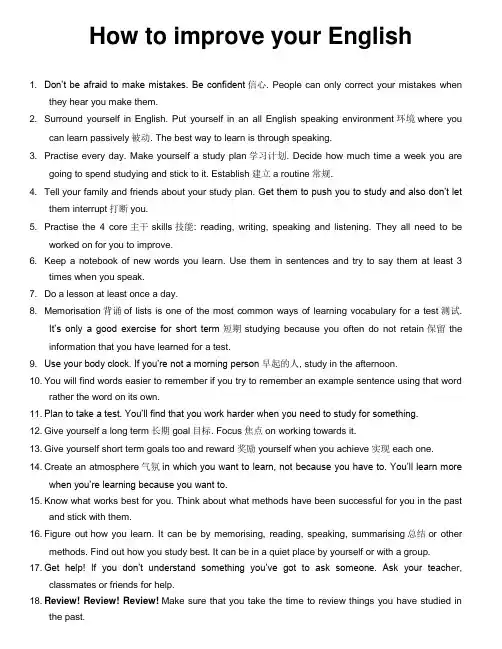
How to improve your English1. Don’t be afraid to make mistakes. Be confident信心. People can only correct your mistakes whenthey hear you make them.2. Surround yourself in English. Put yourself in an all English speaking environment环境where youcan learn passively被动. The best way to learn is through speaking.3. Practise every day. Make yourself a study plan学习计划. Decide how much time a week you aregoing to spend studying and stick to it. Establish建立a routine常规.4. Tell your family and friends about your study plan. G et them to push you to study and also don’t letthem interrupt打断you.5. Practise the 4 core主干skills技能: reading, writing, speaking and listening. They all need to beworked on for you to improve.6. Keep a notebook of new words you learn. Use them in sentences and try to say them at least 3times when you speak.7. Do a lesson at least once a day.8. Memorisation背诵of lists is one of the most common ways of learning vocabulary for a test测试.It’s only a good exercise for short term短期studying because you often do not retain保留the information that you have learned for a test.9. Use your body clock. If you’re not a morning person早起的人, study in the afternoon.10. You will find words easier to remember if you try to remember an example sentence using that wordrather the word on its own.11. Plan to take a test. You’ll find that you work harder when you need to study for something.12. Give yourself a long term长期goal目标. Focus焦点on working towards it.13. Give yourself short term goals too and reward奖励yourself when you achieve实现each one.14. Create an atmosphere气氛in which you want to learn, not because you have to. You’ll learn morewhen you’re learning because you want to.15. Know what works best for you. Think about what methods have been successful for you in the pastand stick with them.16. Figure out how you learn. It can be by memorising, reading, speaking, summarising总结or othermethods. Find out how you study best. It can be in a quiet place by yourself or with a group.17. Get help! If you don’t understand something you’ve got to ask someone. Ask your teach er,classmates or friends for help.18. Review! Review! Review! Make sure that you take the time to review things you have studied inthe past.19. It’s not a good idea to study on your own for more than 30 minutes at a time. Take regular breaks,get some fresh air and stretch your legs伸展你的腿.20. Don’t be in such a hurry to move up a level. Concentrate on the level you are at now.21. Watch DVDs rather than TV. It’s better to use something that you can watch over again to catchinformation you might have missed the first time.22. Watching TV only gives you the chance to hear something correctly first time. This is better for highlevel students. It can be great practice for speaking to native English speakers so you don’t have to ask them to repeat themselves!23. Read graded readers. These books are especially written for your level. Read a whole novel. Youcan do it! You’ll feel great afterwards.24. Children’s books have easier words and are a good alternative替代to graded readers.25. Read for the general meaning first. Don’t worry about understanding every word, then go back andlook up new words.26. For a word you don’t understand in a sentence, look at the other words around it. They will give youa hint暗示. Try to guess the meaning from the context景况.27. Use English whenever you can. It’s as simple as that!28. Don’t translate into English from your own language. Think in English to improve your fluency流畅.Talk to yourself…but not on the bus otherwise people will think you have gone crazy!29. You can’t learn English from a book. Like driving a car, you can only learn through doing it.30. The most natural自然way to learn grammar is through talking.31. Keep an English diary日记or journal. Start by writing a few sentences a day and then get into thehabit of writing more.32. Why not start an online blog博客 and share your writings with the world?33. Keep an eye on your punctuation标点as it can totally change what you’re trying to say. Check outthe difference in meaning between these two sentences: “A woman without her man is nothing” and “A woman: without her, man is nothing”.34. Sing your heart out! Show the world your beautiful voice! Learn English songs and sing along withthem to improve fluency and intonation腔调… anyone for Karaoke卡拉OK?35. Get a penfriend笔友or use chat-rooms, forums论坛and community sites. If you can’t speak tosomeone in English, this is the next best thing.36. Shadow English CDs. Listen to a few sentences then repeat what you heard. Focus on the rhythm韵律and intonation.37. Have English radio on in your house. Even if you are not actively listening to it, you will still betraining your ears.38. Dictation听写. Listen to a CD or friend and write down what you hear.39. Nobody likes to hear their own voice, but be brave and try it! Record记录your voice and listen toyour pronunciation and intonation. It will help you to identify鉴定your problem areas.40. Ask your helpful teacher if you can record his lesson. This is a great way to review. You can alsolisten to your teachers speaking speed and intonation.41. Use an English/English dictionary as it will help you to keep thinking in English and not translating.42. If an English/English dictionary seems scary, there are learner’s dictionaries for English students ofyour level.43. Don’t become too reliant信赖的on your dictionary. Your dictionary should be an aid援助, not yourmain teacher. Try to guess the meaning of words rather than going straight for your dictionary.44. Don’t give up! Stay positive! Sometimes you will feel that you aren’t learning quickly enough.Everyone feels like t his, don’t worry about it. You’ll get there in the end.45. Enjoy it! We learn more when we are having fun!46. If you get nervous when speaking, take two deep breaths before you say something. You’ll speakbetter when you feel relaxed.47. Keep yourself motivated by looking back at the textbooks and CDs you used in the past. You’ll besurprised at how easy they seem to you now! Congratulations, your level is improving!48. You are never too young or too old to start learning English. Don’t make excuses not to learn. Whatare you waiting for?49. If you haven’t gotten the results you wanted yet, it’s not because you’re bad at languages, it’sbecause you haven’t found your own special way of learning yet.50. Use resources资源which match your level. Don’t use texts/listening exercises which are too difficultor too easy. Use materials which challenge挑战you but don’t frustrate阻挠you.51. Don’t worry about making your accent perfect. It’s an important part of your cultural identity to keepyour accent. Native English speakers enjoy hearing English spoken with an accent.52. There are many types of English: British, American, South African and so on. None of these arewrong or not as important. English is English.53. Instead, be aware of the differences in American and British English and use your wordsaccordingly. For example: Elevator (US) / Lift (British).54. Use post-it notes and stick them around your home. You can use them to label标签things. Stickone on your pet dog!55. Use your intuition直觉. Go with your gut feeling, you’ll be surprised how often your first guess is theright guess. Like we said before, be confident.56. Gather your thoughts. Take a second to think about what you’re going to say. You know thegrammar, but maybe you don’t use it correctly when you speak.57. Meet new people. Make the effort to mix with English speakers in your town. You could join a club俱乐部or go to bars where foreigners hang out. Buy one a drink, they love that!58. Be the person to start conversations in English. Try to keep the conversations moving and uselistening words (‘really?’ / ‘go on…’/ ‘what happened then?’) Don’t wait for others to speak to you.Get in there!59. Debate辩论. Discuss topics in a group. Each person should choose a viewpoint (even if you don’tagree with it) and debate it within the group. Make sure you get your point across. Learn to listen actively. Active listening will help in the classroom and it will help you get more out of, and contribute 贡献more to, group study sessions. Focus on the person who is talking. Don’t fidget or become distracted by other people or events. Concentrate on the speaker with your ears and eyes. Follow the movements the speaker makes in an effort to hear more. It may help to repeat what you hear others say in an effort to understand their thoughts.60. It’s not enough to only learn English words. You can teach a parrot English words but that doesn’tmean it can speak English! You still need to have an understanding of grammar.61. Keep it up! If you take a break from speaking English, you will find that your level decreases and allyour hard work has been wasted.62. Don’t be put off by a bad test score. Sometimes students have the ability to pass an English test,but can’t communicate well with English speakers. If you can speak freely in English, you should be proud of yourself.63. Remember that as long as you have tried your hardest, you have succeeded!64. Learn English with a friend. You’ll have someone you can practice with and you can motivate刺激each other to study.65. Keep in mind that it takes longer to improve when our level is high. Usually the fastest progress ismade when we are beginners. Don’t think that you’re suddenly not learning anymore, it’s just a less noticeable progress.66. Make sure that your English matches the occasion. It’s OK to use slang俚语with friends but not in abusiness meeting. Decide in which situation it’s appropriate to use the words and phrases you have learned.67. Textbook English is often different from the way we casually speak. To learn casual ‘slang’ watchmovies.68. Idioms can be difficult to memorise, but they are great fun to use and they’ll make your English morecolourful.69. Think about your strong and weak points. Write down which areas you want to improve on and workon improving them. Of course, don’t ignore your strong points. Congratulate yourself on how well you’ve done!70. For fluency, try image training. Before you go to that restaurant think through what the waiter islikely to say to you. Think of what phrases you are going to use.71. If you studying abroad, mix with people from other countries not only people from your own country.It’s not a good idea for you to live in a shared house with people from your own country. Enjoy a more cultural文化experience by spending time with other nationalities国籍.72. Have you thought about getting a job or doing an internship实习abroad?73. Get yourself a qualified teacher. Who wants to learn wrong things?74. Once you have a basic level of English explore the different ways you can say the same thing. Thismakes your English more interesting to the listener and it shouldn’t be too difficult for you because y ou already know the basics. For example, how many ways can we say, ‘Goodbye‘ in English?75. When you are on your English course, be prepared for your class. Do your homework as soon aspossible and hand it in on time. Review your notes and your last lesson a few minutes before the class. Doing this will refresh your memory and you’ll be warmed up for lesson.76. Don’t get distracted愣in class. Focus on the lesson, don’t stare out of the window. Don’t be late,arrive a few minutes before the start of the lesson. Don’t sit next to people who won’t speak to you in English. Switch off your phone. Be organized, remember to take your textbook, notebook and pen.77. Find a comfortable, peaceful place for quiet study. You need somewhere where you can focus100%.。
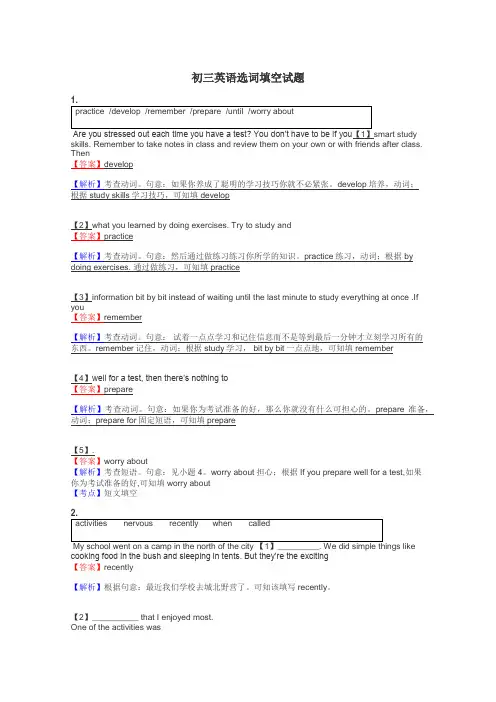
初三英语选词填空试题Are you stressed out each time you have a test? You don’t have to be if you【1】smart study skills. Remember to take notes in class and review them on your own or with friends after class. Then【答案】develop【解析】考查动词。
句意:如果你养成了聪明的学习技巧你就不必紧张。
develop培养,动词;根据study skills学习技巧,可知填develop【2】what you learned by doing exercises. Try to study and【答案】practice【解析】考查动词。
句意:然后通过做练习练习你所学的知识。
practice练习,动词;根据 by doing exercises. 通过做练习,可知填 practice【3】information bit by bit instead of waiting until the last minute to study everything at once .If you【答案】remember【解析】考查动词。
句意:试着一点点学习和记住信息而不是等到最后一分钟才立刻学习所有的东西。
remember记住,动词;根据study学习, bit by bit一点点地,可知填 remember【4】well for a test, then there’s nothing to【答案】prepare【解析】考查动词。
句意:如果你为考试准备的好,那么你就没有什么可担心的。
prepare准备,动词;prepare for固定短语,可知填prepare【5】.【答案】worry about【解析】考查短语。
句意:见小题4。
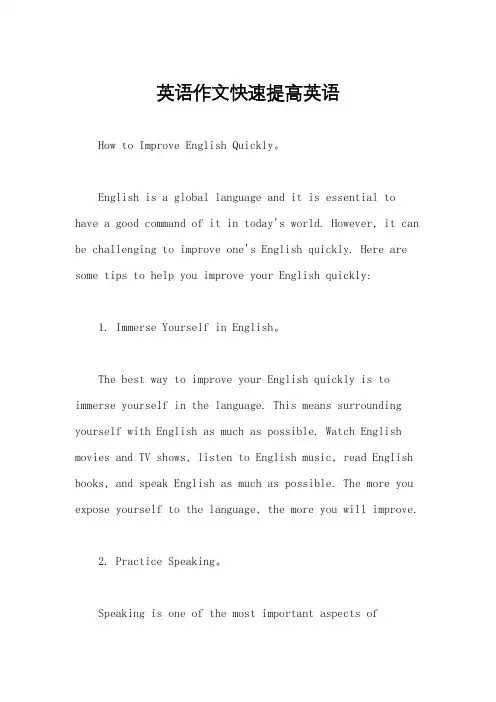
英语作文快速提高英语How to Improve English Quickly。
English is a global language and it is essential to have a good command of it in today's world. However, it can be challenging to improve one's English quickly. Here are some tips to help you improve your English quickly:1. Immerse Yourself in English。
The best way to improve your English quickly is to immerse yourself in the language. This means surrounding yourself with English as much as possible. Watch English movies and TV shows, listen to English music, read English books, and speak English as much as possible. The more you expose yourself to the language, the more you will improve.2. Practice Speaking。
Speaking is one of the most important aspects oflearning a language. Find a language exchange partner or join a language club to practice speaking with others. You can also practice speaking to yourself by narrating your daily activities in English or having conversations with imaginary people.3. Use English Apps。
英文作文快速提升方法英文:To quickly improve your English writing skills, there are a few things you can do. First, read as much as you can in English, whether it's books, articles, or even social media posts. This will help you get a feel for the language and learn new vocabulary and sentence structures. Second, practice writing as often as possible. You can start by writing short paragraphs or even just a few sentences each day, and gradually work your way up to longer pieces. Third, get feedback on your writing from someone who is proficient in English. This can be a teacher, tutor, or even a friend who is a native speaker. They can help you identify areas where you need improvement and give you tips on how to improve.Another way to improve your English writing skills isto immerse yourself in English-speaking environments. This could mean watching English-language TV shows or movies,listening to English-language podcasts or music, or even joining English-speaking social groups. The more you're exposed to the language, the more natural it will becomefor you to write in English.Finally, don't be afraid to make mistakes. Writing is a skill that takes time and practice to master, and everyone makes mistakes along the way. The important thing is tolearn from your mistakes and keep practicing.中文:要快速提高英语写作能力,有几个方法可以尝试。
英语快速提高的方法Improving Your English Quickly。
Improving your English skills can be a challenging task, but with the right methods and dedication, you can make significant progress in a short amount of time. Whether you are preparing for an exam, looking to advance in your career, or simply want to communicate more effectively in English, there are several strategies you can use to accelerate your learning. In this document, we will explore some effective methods for quickly improving your English skills.1. Immerse Yourself in the Language。
One of the most effective ways to improve your English quickly is to immerse yourself in the language as much as possible. This can be done by surrounding yourself with English-speaking environments, such as watching English movies, listening to English music, and reading English books. Additionally, try to practice speaking and thinking in English as much as possible, even if it means starting with simple conversations or writing in a journal.2. Set Clear and Achievable Goals。
要怎样让英语快速进步作文How to Improve English Quickly。
English is a global language that is widely spoken and used in many fields such as education, business, and communication. Therefore, it is essential to have a good command of English to achieve success in today's world. However, many people struggle to improve their English skills, so here are some tips on how to improve English quickly.Firstly, immerse yourself in the language. This means surrounding yourself with English as much as possible. Watch English movies, TV shows, and news, listen to English music, and read English books, newspapers, and magazines. By doing so, you will be exposed to different accents, vocabulary, and grammar structures, which will help you improve your listening, speaking, reading, and writing skills.Secondly, practice speaking English every day. Find a language exchange partner or join a conversation club to practice speaking with native speakers or other learners. You can also record yourself speaking and listen to the recordings to identify your mistakes and improve your pronunciation. Moreover, try to think in English and use English to describe your daily activities and thoughts.Thirdly, learn English grammar and vocabulary systematically. Grammar and vocabulary are the building blocks of any language, so it is important to have a good understanding of them. You can use grammar books, online resources, or take a course to learn English grammar and vocabulary. Additionally, try to use new words and phrasesin your daily conversations and writing to reinforce your learning.Fourthly, take advantage of technology. There are many language learning apps and websites that can help you improve your English skills. For example, Duolingo, Memrise, and Babbel offer interactive lessons, quizzes, and games to practice grammar, vocabulary, and pronunciation. You canalso use language exchange apps such as HelloTalk and Tandem to practice speaking with native speakers.Finally, be consistent and persistent. Learning a language takes time and effort, so it is important to stay motivated and disciplined. Set realistic goals and create a study plan that fits your schedule and learning style. Celebrate your achievements along the way and don't be discouraged by setbacks or mistakes.In conclusion, improving English quickly requires a combination of immersion, practice, systematic learning, technology, and persistence. By following these tips, you can enhance your English skills and achieve your language goals. Remember, the key to success is to enjoy the learning process and never give up.。
快速提高英语的方法英语作文English: One of the most effective ways to quickly improve your English writing skills is to practice consistently. Set aside dedicated time each day to write in English, whether it's journaling, writing essays, or participating in online writing communities. Additionally, reading extensively in English can help you become familiar with different writing styles and improve your vocabulary. It's also helpful to seek feedback from native English speakers or language teachers to identify areas for improvement and receive constructive criticism. Another useful strategy is to study grammar and syntax rules, as having a strong foundation in these areas can enhance the overall quality of your writing. Lastly, don't be afraid to make mistakes and learn from them – the more you practice, the more your writing skills will improve over time.中文翻译: 为了迅速提高你的英语写作技能,最有效的方法之一是保持持续练习。
如何快速学会英语小学作文How to Learn English Quickly in Primary School。
English is an important subject in primary school, and learning it well can greatly benefit students in their future studies and careers. However, many students find it difficult to learn English and struggle to improve their skills. Here are some tips on how to learn English quickly and effectively in primary school.1. Set goals and make a plan。
Before you start learning English, it's important to set goals for yourself and make a plan to achieve them. For example, you might want to improve your speaking skills, increase your vocabulary, or pass a certain exam. Once you have a clear idea of what you want to achieve, you can plan out the steps you need to take to get there.2. Practice every day。
Learning English is like learning any other skill –the more you practice, the better you will get. Try to practice your English every day, even if it's just for afew minutes. You can listen to English songs, watch English movies or TV shows, or read English books. The more you immerse yourself in the language, the more you will improve.3. Use English in real-life situations。
英语作文如何提高英语How to Improve English。
English is a global language and mastering it can open up a world of opportunities. Whether you want to travel, study abroad, or advance in your career, having a strong command of English can be incredibly beneficial. If you're looking to improve your English skills, here are some effective strategies to help you achieve your goal.First and foremost, it's important to immerse yourself in the language as much as possible. This means surrounding yourself with English-speaking environments, such as watching English movies and TV shows, listening to English music, and reading English books and news articles. By exposing yourself to the language on a daily basis, you'll naturally start to pick up new vocabulary and improve your understanding of grammar and sentence structure.Another key aspect of improving your English is topractice speaking and writing as much as possible. Find a language exchange partner or join a conversation groupwhere you can engage in English conversations. This willnot only help you improve your speaking skills but also boost your confidence in using the language. Additionally, writing in English regularly, whether it's through journaling, blogging, or simply sending emails to friends, can help you become more comfortable with expressingyourself in written form.In addition to practicing speaking and writing, it's essential to focus on building a strong foundation in grammar and vocabulary. There are many online resources and apps available that can help you learn and review grammar rules and expand your vocabulary. Consider using flashcards, language learning apps, and online courses to supplement your learning and reinforce your understanding of the language.Furthermore, don't underestimate the power of formal language education. Enrolling in an English language course or hiring a tutor can provide you with personalizedinstruction and feedback to help you improve your skills more quickly. Many language schools and institutions offer courses specifically designed for non-native speakers, which can be a great way to receive structured learning and support.Lastly, be patient and persistent in your efforts to improve your English. Learning a new language takes time and dedication, so it's important to stay motivated and consistent in your practice. Set realistic goals for yourself and celebrate your progress along the way. Remember that every small step you take towards improving your English will bring you closer to fluency.In conclusion, improving your English skills requires a combination of exposure, practice, and dedication. By immersing yourself in the language, practicing speaking and writing, building a strong foundation in grammar and vocabulary, seeking formal education, and staying persistent, you can make significant strides in your English proficiency. With time and effort, you'll find yourself becoming more confident and proficient in usingEnglish in various contexts. Good luck on your language learning journey!。